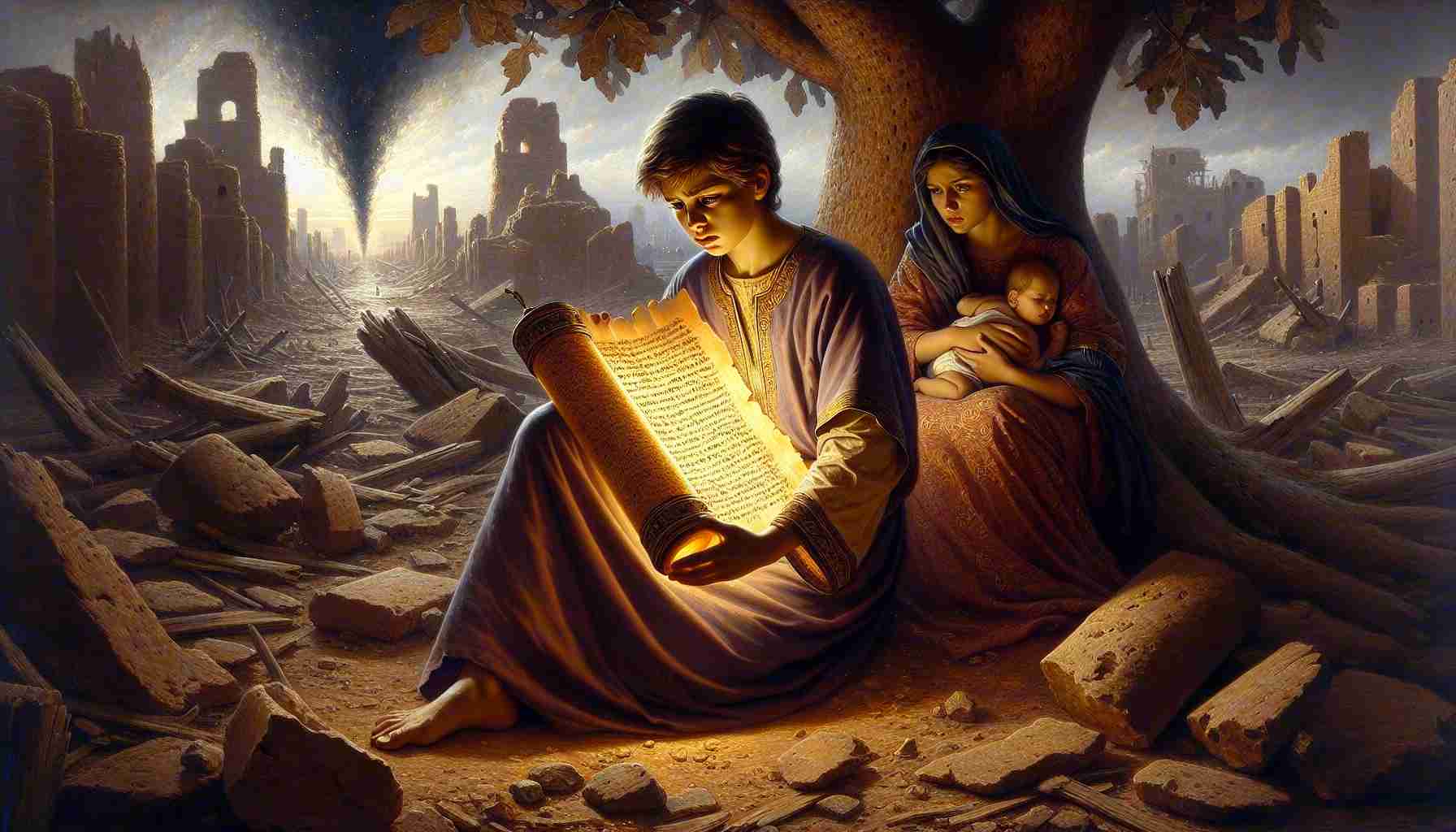

The smell of smoke still clung to my tunic.
I was thirteen the day Jerusalem was taken. My father was a scribe, and I had just finished copying a Psalm when the sky darkened—not with clouds, but with the dust of the Babylonian army marching closer. My name? It doesn’t matter now. All that matters is what I saw…and how it changed me.
When the soldiers broke through the city gates, my mother pulled me into the alley behind our home. “Stay quiet,” she whispered. “No matter what.”
I remember the trembling of her hand on my shoulder, the pounding of my own heart. We watched from the shadows as our neighbors were pulled from their homes, their cries rising like smoke to the heavens. The Temple—our holy place, where my father had taught me to bow and whisper the name of God with awe—was swallowed by fire.
King Nebuchadnezzar, the ruler of Babylon, had sent his armies to crush our city. They didn’t just conquer Jerusalem—they humiliated her. The poor were left to starve. Our leaders were dragged away in chains. And I, a boy who once believed that God’s presence lived forever in the Temple, stood among ashes.
I didn’t speak for days.
Then I saw him—Jeremiah, the prophet. His hair was tangled, his clothes torn. He had begged the people to listen for years, warning us that if we turned away from God’s laws, destruction would come. But few listened. Now, he wandered the ruined streets, speaking not with fury, but with grief. He sat near the Temple’s remains, writing. At first, I thought he was just weeping. But then I heard the words he spoke aloud as he wrote: “How she sits alone, the city that was once so full of people…”
Those words pierced me like arrowheads.
He wasn’t just writing. He was mourning. He was teaching us how to mourn.
That night, I found a scrap of parchment and copied what I remembered of his words. Each line a cry. Each verse a tear. Lamentations, they would later call it—the scroll called Eichah in our tongue. I didn’t know then that others would read it for generations. All I knew was: these words made the sorrow less lonely.
I thought I had lost everything. But Jeremiah showed me that even in ruin, God listens—if we speak with honesty. His scroll wasn’t filled with answers. It was filled with pain turned into prayer.
Years later, in exile, I still keep that parchment. Worn, yes. But sacred. Because in the ruins of Jerusalem, I discovered something I didn’t expect: sorrow can become a path back to faith. Loss can teach us how to listen for God again.
I no longer see the Temple when I close my eyes. I see people—carrying each other, mourning together, holding God's name even as they cry. And somehow, that gives me hope.
The smell of smoke still clung to my tunic.
I was thirteen the day Jerusalem was taken. My father was a scribe, and I had just finished copying a Psalm when the sky darkened—not with clouds, but with the dust of the Babylonian army marching closer. My name? It doesn’t matter now. All that matters is what I saw…and how it changed me.
When the soldiers broke through the city gates, my mother pulled me into the alley behind our home. “Stay quiet,” she whispered. “No matter what.”
I remember the trembling of her hand on my shoulder, the pounding of my own heart. We watched from the shadows as our neighbors were pulled from their homes, their cries rising like smoke to the heavens. The Temple—our holy place, where my father had taught me to bow and whisper the name of God with awe—was swallowed by fire.
King Nebuchadnezzar, the ruler of Babylon, had sent his armies to crush our city. They didn’t just conquer Jerusalem—they humiliated her. The poor were left to starve. Our leaders were dragged away in chains. And I, a boy who once believed that God’s presence lived forever in the Temple, stood among ashes.
I didn’t speak for days.
Then I saw him—Jeremiah, the prophet. His hair was tangled, his clothes torn. He had begged the people to listen for years, warning us that if we turned away from God’s laws, destruction would come. But few listened. Now, he wandered the ruined streets, speaking not with fury, but with grief. He sat near the Temple’s remains, writing. At first, I thought he was just weeping. But then I heard the words he spoke aloud as he wrote: “How she sits alone, the city that was once so full of people…”
Those words pierced me like arrowheads.
He wasn’t just writing. He was mourning. He was teaching us how to mourn.
That night, I found a scrap of parchment and copied what I remembered of his words. Each line a cry. Each verse a tear. Lamentations, they would later call it—the scroll called Eichah in our tongue. I didn’t know then that others would read it for generations. All I knew was: these words made the sorrow less lonely.
I thought I had lost everything. But Jeremiah showed me that even in ruin, God listens—if we speak with honesty. His scroll wasn’t filled with answers. It was filled with pain turned into prayer.
Years later, in exile, I still keep that parchment. Worn, yes. But sacred. Because in the ruins of Jerusalem, I discovered something I didn’t expect: sorrow can become a path back to faith. Loss can teach us how to listen for God again.
I no longer see the Temple when I close my eyes. I see people—carrying each other, mourning together, holding God's name even as they cry. And somehow, that gives me hope.